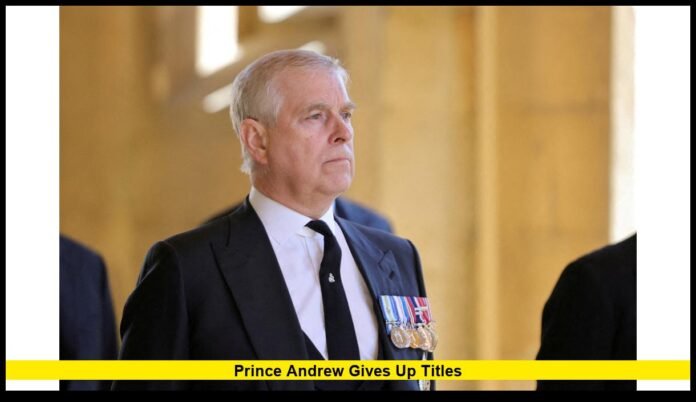Prince Andrew gives up titles today as the embattled royal formally relinquishes use of his Duke of York title and other honours in a sweeping move that underscores his deepening fall from royal standing. The decision comes following renewed scrutiny tied to allegations linked to Jeffrey Epstein and a posthumous memoir by his accuser.
What Happened: Andrew’s Title Renunciation
On October 17, 2025, Buckingham Palace released a statement confirming that Prince Andrew will no longer use his title of Duke of York, along with honours like the Knight Grand Cross of the Royal Victorian Order and Royal Knight Companion of the Order of the Garter.
The statement emphasized that the decision followed discussions with King Charles III and other senior royals, aimed at reducing distractions from the monarchy’s public functions.
Prince Andrew reaffirmed his denial of all allegations, saying in his statement he must “go a step further” to protect the royal family.
Technically, Andrew retains the dukedom because only an act of Parliament can revoke a hereditary title. Yet, he has agreed not to use it.
Which Titles and Honours Are Affected
Below is a breakdown of what Andrew is giving up and what he retains:
| Title / Honour | Status After Renunciation |
|---|---|
| Duke of York | Retained legally, but no longer used publicly |
| Knight Grand Cross of the Royal Victorian Order | Relinquished |
| Royal Knight Companion of the Order of the Garter | Relinquished |
| Earl of Inverness & Baron Killyleagh (subsidiary titles) | Also no longer used publicly |
| “Prince” (birthright title) | Still held, cannot be removed by this move |
| Royal Lodge residence | Remains his home under lease rules |
| His daughters’ titles (Princess Beatrice, Princess Eugenie) | Unchanged |
His ex-wife, Sarah Ferguson, will likewise stop using the Duchess of York title.
As part of prior adjustments, Andrew had already lost his military roles and royal patronages in 2022 as pressure mounted, especially after the civil lawsuit brought by Virginia Giuffre.
Why Now? Motivations and Timing
The timing of Prince Andrew gives up titles is not accidental—it follows a surge in public attention tied to:
- Excerpts from Virginia Giuffre’s posthumous memoir, which detail alleged encounters with Andrew when she was a teenager.
- Leaked documents and archival evidence revealing emails and logs connecting Andrew to Epstein, including a 2011 message stating “we are in this together.”
- Growing public and political pressure: a poll shows strong support for stripping Andrew of titles, with 67% of Britons in favor.
- Internal royal concern: aides believed Andrew’s controversies were becoming a sustained distraction that could damage the monarchy.
Royal commentators and analysts claim that this move was not entirely Andrew’s choice, suggesting he had little alternative given the escalating scandals.
King Charles reportedly expressed relief over the outcome.
Legal and Constitutional Constraints
Since Prince Andrew gives up titles through an agreement rather than by legal mandate, the constitutional and parliamentary context is key:
- A hereditary title like Duke of York can only be stripped by an Act of Parliament. The royal decision is symbolic and voluntary—not legally binding on the title itself.
- The monarchy retains prerogative powers over honours and knighthoods, allowing the Crown to revoke or alter such honours separately from peerage.
- Parliament could act in the future, but as of now, no bill has been introduced to strip Andrew of his position in the line of succession.
Thus, Prince Andrew gives up titles in practice, not in law.
Public and Royal Reaction
- Royal Family: The king and senior royals reportedly backed the move. Prince William and their advisers were consulted in advance.
- Public sentiment: With polls favoring further action, many see this as a partial but overdue accountability step.
- Giuffre’s family & survivors: They welcomed the renunciation as validation, though they also emphasize that the step is symbolic and not full justice.
Still, critics warn the move doesn’t absolve accountability, and some call for Parliament to strip even the princely title.
What It Means Going Forward
- Monarchy image control: With Andrew no longer publicly wielding royal titles, the monarchy hopes to reset its image and reduce media distractions.
- Andrew’s public role: His role will be even more marginalized. He is unlikely to attend major royal events or be given official functions.
- Future legal action: Unless Parliament intervenes, all that remains is his birthright as prince and his residence under lease terms.
- Impact on daughters and ex-wife: Princess Beatrice and Princess Eugenie retain their titles and standing. Sarah Ferguson will cease using the Duchess of York style.
The statement that “Prince Andrew gives up titles” is thus accurate in practice, though not judicial or statutory.
In sum, Prince Andrew gives up titles marks a dramatic milestone: he is formally withdrawing from the remaining symbols of royal patronage and honour. Yet, due to the constraints of British constitutional law, his ultimate status still rests on parliamentary authority.
What are your thoughts on this unprecedented royal shift? Share your views in the comments below.
